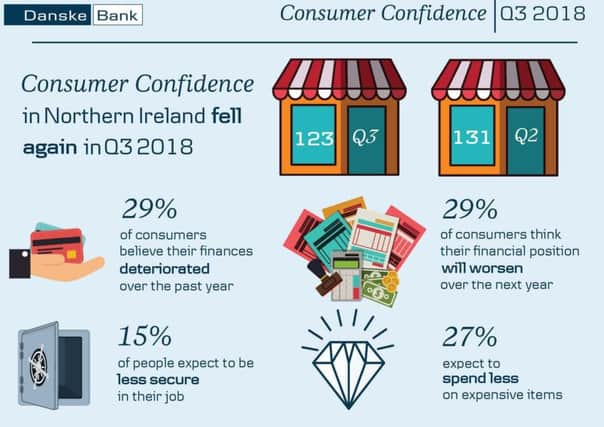Consumer confidence on the slide again says Danske report


The bank’s Northern Ireland Consumer Confidence Index fell to a reading of 123 for Q3, down from 131 in the last quarter and 135 a year ago.
Published today, the report reveals that a third of people felt their financial position had worsened over the past year and would worsen again over the coming 12 months.
Advertisement
Hide AdAdvertisement
Hide Ad“This fall in consumer confidence marked the second consecutive quarterly decline in our index and resulted in confidence levels hitting their lowest point in 2018 so far,” said Danske Bank chief economist Conor Lambe.
Falls were observed both over the quarter and over the year in the parts of the index that examine how people feel about their current finances, future finances, job security and future spending.
“Just under a third of people highlighted the local political impasse and the lack of a functioning Executive as the factor that had the largest negative impact on their confidence levels.
“Those surveyed also pointed to high inflation as something which put a dent in confidence.”
Advertisement
Hide AdAdvertisement
Hide AdRising wage levels provieded one bright point in the survey, he said, as one in five surveyed said that had the biggest positive impact on how they were feeling.
This follows official data showing that over the year to April 2018, weekly earnings for full-time employees in Northern Ireland increased at their fastest rate since 2015.
Nevertheless, 13% of people highlighted the pace of progress during the Brexit negotiations in recent months as the factor which had the biggest negative impact on them, while 11% said the Government’s longer-term Brexit objectives affected them most negatively.
This compares with just 8% and 6% of people respectively who identified these same two factors as having the biggest positive impact on them.
Advertisement
Hide AdAdvertisement
Hide Ad“It appears as if the uncertainty around Brexit is an issue not just for businesses in Northern Ireland, but for consumers as well,” he added.
Women felt worse about their current financial position than men, with 20% of men feeling their finances had improved over the past year, while 28% felt worse off.
Just 14% of female respondents said they felt better off than a year ago and 31% felt their finances had deteriorated.